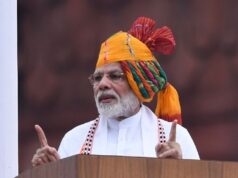Justice Katju is known for his frank and sometimes outrageous statements but this time he is right. He slammed and demolished the Indian judiciary system. He went ahead he said that some sought of revolution must take place to fix the current system and otherwise it will collapse. (Watch the video at the bottom of this article).
Justice Markandey Katju is the former Chairman, Press Council of India. Prior to his appointment as Chairman, Press Council of India, he served as a Judge at the Supreme Court of India. Before being elevated as a judge to the Supreme Court, he had earlier served as the Chief Justice of Delhi High Court, Madras High Court and as acting Chief Justice of Allahabad High Court.
Earlier, Awarding capital punishment to as many as six accused for one murder does not happen often in India. Nor do we generally get to see someone applauding a judge for putting her dad on the death row and cribbing about her mother being let off. But this was no ordinary crime. It saw a caste Hindu man hiring goons to finish off his daughter and Dalit son-in-law on a busy Udumalaipet road in Tamil Nadu around 3 pm last year. While V Shankar died, S Gowsalya survived the assault and fought tenaciously to assert her right to choose her spouse.
While civil society normally gets worked up against death penalty, one section decided it was fair, saying there is nothing honourable in honour killing and it must attract the highest penalty in the land. In fact, a Supreme Court Bench of Justice Markandey Katju and Justice Gyan Sudha Misra had sought to treat honour killings as the “rarest of rare” cases. “This is necessary as a deterrent for such outrageous, uncivilised behaviour. All persons who are planning to perpetrate ‘honour’ killings should know that the gallows await them,” Katju said.
Shankar’s killing got a lot of traction because the grainy CCTV footage on the loop on TV sets brought the impudence with which Gowsalya’s parents hatched the plot and executed it to every drawing room. But most cases of honour killings go unreported or get bundled under other sections like suicide in police records.
According to the National Crime Records Bureau, there were 71 cases of honour killing in 2016. While Madhya Pradesh, Uttar Pradesh and Gujarat topped the charts, Tamil Nadu had recorded just one such case, which suggests under-reporting. Activists for long have been demanding a special Act to deal with honour crimes.
In 2011, the Law Commission circulated the draft Prohibition of Unlawful Assembly (Interference with the Freedom of Matrimonial Alliances) Bill aimed at cracking down on honour crimes by khap panchayats. Several states adopted the legislation but Tamil Nadu chose to reject it.




